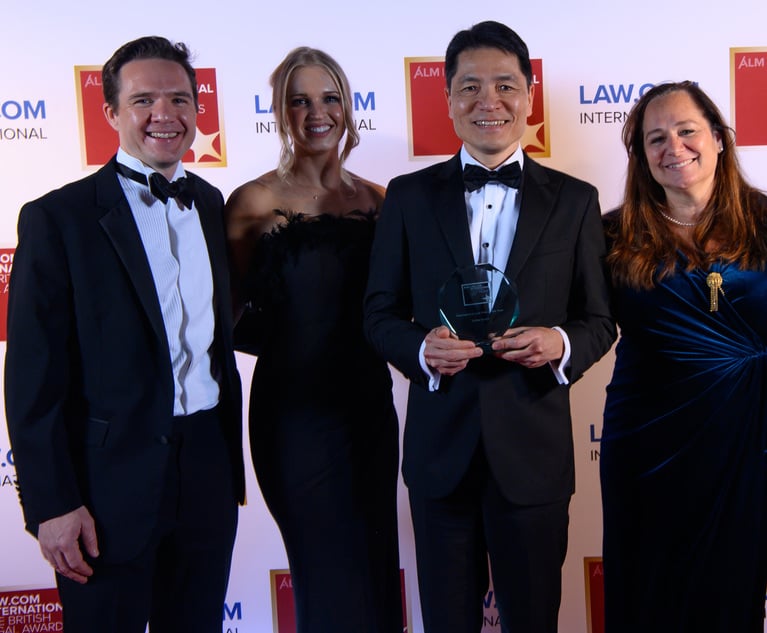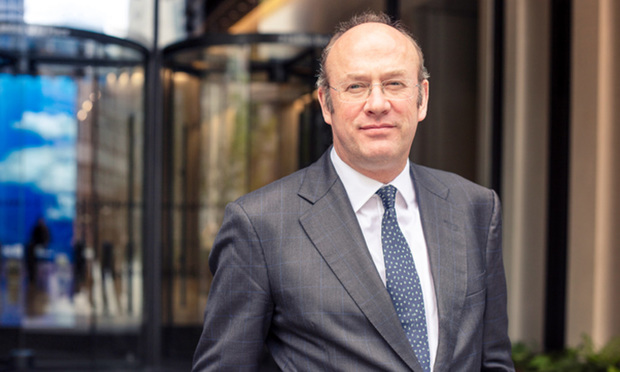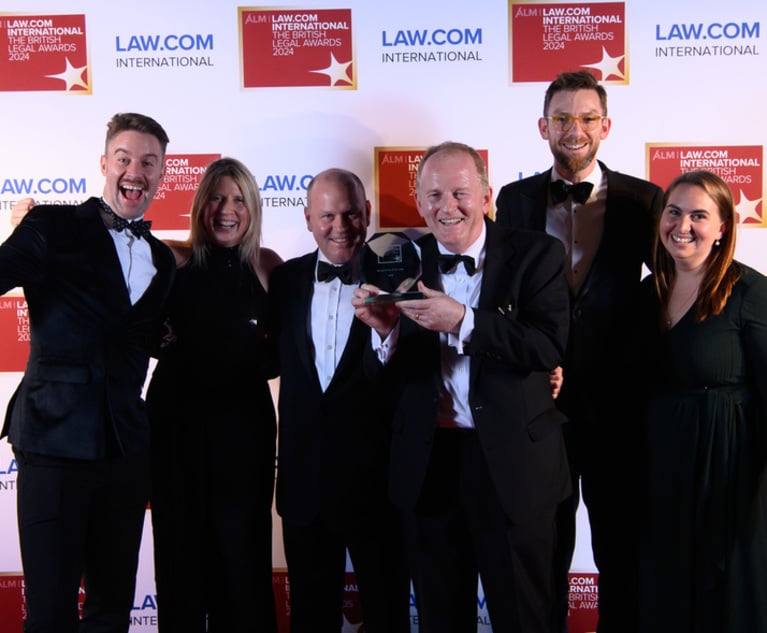Q&A: Litigation Veteran Jonathan Kelly On Coping With Barristers' Fees, Crime Gangs and The Northern Line
One of the U.K.'s leading banking litigators talks about spiritual experiences, party tricks and the most stressful part of a case.
April 29, 2019 at 04:32 AM
7 minute read
Cleary Gottlieb Steen & Hamilton litigation partner Jonathan Kelly has spent more than 30 years at the coalface of U.K. commercial litigation disputes. He joined the U.S. firm's London office from Simmons & Simmons in 2010.
He is regarded as one of the country's top banking litigation lawyers and his clients have included the likes of Goldman Sachs, UBS, BNP Paribas, the Russian Federation and several sovereign wealth funds.
Here he talks about nearly sending a highly sensitive fax to the Daily Mail news desk, dealing with dangerous cases and aggressive lawyers, and creating faces on the potato topping of a shepherd's pie.
Why did you become a lawyer?
I had emerged from a Jesuit education that extolled the virtues of analysis and argument, and saw the opportunity to develop these in a professional context. English law and English lawyers were going global, which was tremendously exciting and offered lots of promise. I had neither the science for medicine nor the faith for priesthood, so it seemed like a natural choice.
Have you ever regretted the decision?
No, the promise has been more than fulfilled. Actually… maybe once. Around the time of Life on Earth, I had a pipedream of gently nudging David Attenborough to one side and taking his place as presenter-in-chief of natural world television. Happily for our understanding of the planet and its myriad life forms, that remained only a dream.
Who has been the biggest influence on your career?
My wife. A science-trained, former patent litigator, she understands the demands involved in the practise of law but also the importance of a broader perspective beyond the law.
What has been the standout piece of work you've advised on in the last few years and why?
I advised a non-UK client over several years in relation to a bitter dispute with a former joint venture business partner. The dispute was intensely personal, deeply textured and hard-fought. One of the most memorable episodes was when a crime gang from a region in the Caucasus known for its crime gangs, suddenly made a surprise and unwelcome appearance on the battlefield.
What's your proudest professional moment?
Helping to facilitate the settlement of Holocaust art claims arising out of Nazi art spoliation. These claims occupy a uniquely sensitive position at the intersection of law, history and morality. Each piece of spoliated artwork carries with it down through time the echoes of unimaginable suffering. The resolution of the claims provided at least some small measure of closure.
In the commercial sphere, being told by the chief executive and general counsel of a well-known City institution that, after years in the trenches defending their core business against multiple attacks – some of them in public, but many of them behind closed doors – our team had succeeded in saving their business. It returned to being one of the most flourishing businesses in the City.
What's the worst thing that's happened to you while on the job?
In the golden age of faxes, I managed to spot – and stop at the last minute – a highly sensitive report detailing the full extent of a client's litigation exposure from being sent to the wrong fax number. Two digits had been mistakenly switched around and I just intuitively knew that something was wrong when I glanced at the fax coversheet. The wrong fax number turned out to be the Daily Mail's news desk. What might have been…
What advice would you give to young lawyers starting out?
Commit to the law but make time for life; and follow Kipling's advice on triumph and disaster.
What are the best and worst things about your job?
The best is the sheer variety of human and intellectual experience. In 32 years, I cannot remember ever coming across the same set of facts, behaviours or personalities. We probably take it for granted but that variety is what gets you out of bed in the morning.
The worst is occasionally coming across a certain type of lawyer. One who labours under the misapprehension that they are more important than their clients or the team and that it is all about them, or that being uber aggressive for the sake of it is clever or effective. Essentially, anyone who would fall foul of the All Blacks rugby team's famous policy of "no d*ckheads".
What do you hope to do when you retire?
Find a place by the sea, facing to the east for the morning sun, and write a book using whatever I have been carrying in my head on the Northern Line for the past three decades. They say that everyone has a book in them and that that is generally where it should stay. We will have to see. Oh, and fish.
What's the most stressful part of a litigation process?
Watching your witness go into the box. Akin to the final scene in A Tale of Two Cities.
How do you expect London to fare as a disputes centre in the years following Brexit?
Very well. Strangely, I think Brexit has operated like a shot of adrenaline to the body of the London disputes community.
What is the daftest bit of corporate jargon you've heard?
Bob saying: "Let me 'reach out' to Lucy." The two words convey the near-touching, heavenly figures in Michelangelo's The Creation of Adam, when all that is going to happen in fact is that Bob is going to call Lucy.
What's the most outdated thing you've experienced in the industry?
The justification for barristers' brief fees that is still occasionally advanced, that you have to pay someone a premium for their time on the basis that, in doing your work, they are giving up an opportunity to do something else. When you are already paying them once for that work! Better to present briefs as the original, negotiated, risk-sharing fixed fee, which clients can understand.
… and the most innovative?
The approach of the English Courts in developing new concepts or approaches to deal with unforeseen situations. For example, the expanded doctrine of contractual estoppel that emerged from the ashes of the financial crisis helped the courts to hold parties to their bargains, promote contractual certainty, and keep a finger in the dyke of what could otherwise have been a market-threatening flood of litigation. Rough justice in some cases perhaps, and a Marxist historian would have a different take on whether it was simply protecting the established order, but it was effective in holding the ring in countless financial contracts. It stopped a very bad situation from deteriorating further.
How many all-nighters do you tend to do per year?
It depends on the sequencing of trials and other work, but never as many as my transactional colleagues.
Describe your commute in 10 words or less
"Northern Line Nirvana if the timing is right."
What's your best party trick/hidden talent?
Decorating the potato topping on a shepherd's pie with faces or scenes to make the children wonder just what goes on in that oven.
Have you ever had a spiritual experience?
Hiking to the top of the ancient Judaean fortress of Masada in Israel, and looking out over the Dead Sea as dawn broke and the sun rose in the Jordan Valley below.
- Jonathan Kelly is speaking at the Legal Week Banking Litigation & Regulation Forum 2019, at the Jumeirah Carlton Tower in London on 13 Jume.
This content has been archived. It is available through our partners, LexisNexis® and Bloomberg Law.
To view this content, please continue to their sites.
Not a Lexis Subscriber?
Subscribe Now
Not a Bloomberg Law Subscriber?
Subscribe Now
NOT FOR REPRINT
© 2025 ALM Global, LLC, All Rights Reserved. Request academic re-use from www.copyright.com. All other uses, submit a request to [email protected]. For more information visit Asset & Logo Licensing.
You Might Like
View All
International Law Firm of the Year: A Q&A with Sidley Austin's London Managing Partner
5 minute read
Inside Travers Smith's AI Training, Development Efforts
Trending Stories
Who Got The Work
J. Brugh Lower of Gibbons has entered an appearance for industrial equipment supplier Devco Corporation in a pending trademark infringement lawsuit. The suit, accusing the defendant of selling knock-off Graco products, was filed Dec. 18 in New Jersey District Court by Rivkin Radler on behalf of Graco Inc. and Graco Minnesota. The case, assigned to U.S. District Judge Zahid N. Quraishi, is 3:24-cv-11294, Graco Inc. et al v. Devco Corporation.
Who Got The Work
Rebecca Maller-Stein and Kent A. Yalowitz of Arnold & Porter Kaye Scholer have entered their appearances for Hanaco Venture Capital and its executives, Lior Prosor and David Frankel, in a pending securities lawsuit. The action, filed on Dec. 24 in New York Southern District Court by Zell, Aron & Co. on behalf of Goldeneye Advisors, accuses the defendants of negligently and fraudulently managing the plaintiff's $1 million investment. The case, assigned to U.S. District Judge Vernon S. Broderick, is 1:24-cv-09918, Goldeneye Advisors, LLC v. Hanaco Venture Capital, Ltd. et al.
Who Got The Work
Attorneys from A&O Shearman has stepped in as defense counsel for Toronto-Dominion Bank and other defendants in a pending securities class action. The suit, filed Dec. 11 in New York Southern District Court by Bleichmar Fonti & Auld, accuses the defendants of concealing the bank's 'pervasive' deficiencies in regards to its compliance with the Bank Secrecy Act and the quality of its anti-money laundering controls. The case, assigned to U.S. District Judge Arun Subramanian, is 1:24-cv-09445, Gonzalez v. The Toronto-Dominion Bank et al.
Who Got The Work
Crown Castle International, a Pennsylvania company providing shared communications infrastructure, has turned to Luke D. Wolf of Gordon Rees Scully Mansukhani to fend off a pending breach-of-contract lawsuit. The court action, filed Nov. 25 in Michigan Eastern District Court by Hooper Hathaway PC on behalf of The Town Residences LLC, accuses Crown Castle of failing to transfer approximately $30,000 in utility payments from T-Mobile in breach of a roof-top lease and assignment agreement. The case, assigned to U.S. District Judge Susan K. Declercq, is 2:24-cv-13131, The Town Residences LLC v. T-Mobile US, Inc. et al.
Who Got The Work
Wilfred P. Coronato and Daniel M. Schwartz of McCarter & English have stepped in as defense counsel to Electrolux Home Products Inc. in a pending product liability lawsuit. The court action, filed Nov. 26 in New York Eastern District Court by Poulos Lopiccolo PC and Nagel Rice LLP on behalf of David Stern, alleges that the defendant's refrigerators’ drawers and shelving repeatedly break and fall apart within months after purchase. The case, assigned to U.S. District Judge Joan M. Azrack, is 2:24-cv-08204, Stern v. Electrolux Home Products, Inc.
Featured Firms
Law Offices of Gary Martin Hays & Associates, P.C.
(470) 294-1674
Law Offices of Mark E. Salomone
(857) 444-6468
Smith & Hassler
(713) 739-1250











